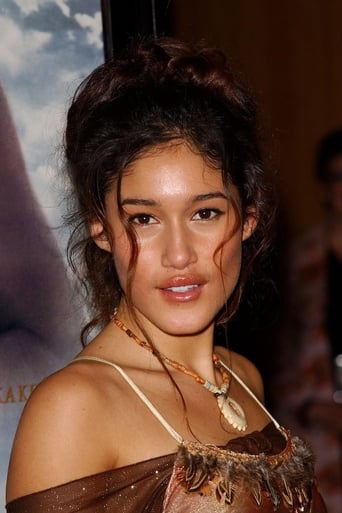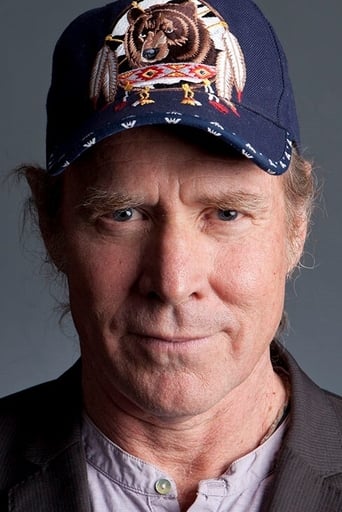Laikals
The greatest movie ever made..!
Matrixiole
Simple and well acted, it has tension enough to knot the stomach.
Matylda Swan
It is a whirlwind of delight --- attractive actors, stunning couture, spectacular sets and outrageous parties.
Ella-May O'Brien
Each character in this movie — down to the smallest one — is an individual rather than a type, prone to spontaneous changes of mood and sometimes amusing outbursts of pettiness or ill humor.
freydis-e
Ka'iulani did exist – at least they got that right. She was an interesting minor historical figure, beautiful, charming, smart, brave and determined. They got that right too, but not much else. Some of the main facts were correct. She was the last heir to the throne of Hawai'i, educated in England and did visit President Cleveland. Her family's monarchy was suppressed and her country annexed by the USA. But history isn't so clear about her motivations – to nobly serve her people, as in the movie, or to retain/regain her family's enjoyment of hereditary power and adulation.The real Ka'iulani was something of a heroic failure. Her charisma and shuttle-diplomacy may have delayed some of the inevitable, but not by much and she achieved almost nothing in the end. She had long suffered from ill-health (ignored in the movie) and died in her early 20s. A true biopic of her life would be fascinating but rather sad and depressing. This manufactured twaddle was nothing much at all.Kilcher is a fine actress, as shown in New World (where she had rather better support) and she does her best here in a feebly written part. The support is horrible, Pepper hamming it up as the villain and Evans as a shoehorned-in love-interest bland and tedious enough to stretch credibility as any kind of interest for a woman like this. The script is trite and ghastly, apart from authentic quotes – Princess K herself had better script-writers! Production values, costumes and settings do pull this up a little way by the bootstraps but not very far.The worst thing here is the manufactured story, not only false but lacking any originality. The romantic strand is trite, ridiculous and way too time-consuming – as though there was nothing more interesting to say about this woman. Ludicrous cameos – nasty people from her schooldays being welcomed and helped by this saintly figure. And a true Hollywood-style happy ending. Meanwhile the true hero of the vain battle to preserve Hawai'i from the USA, Queen Liliʻuokalani, is diminished to an insignificant bit-player. This movie may have been well-intentioned but it's worse than just a waste of time. To turn the history of these real and genuinely fascinating women into this clichéed garbage is criminal.
James Hitchcock
This film tells the story of Victoria Cleghorn, aka Princess Ka'iulani, the last heir to the throne of the Kingdom of Hawaii. She was the daughter of a Scottish financier and a Hawaiian princess, and became heiress presumptive to the throne on the death of her uncle King Kalākaua. She never, however, inherited the crown because her aunt, Queen Liliuokalani, provoked the wrath of the kingdom's white minority by attempting to reverse the Bayonet Constitution, which concentrated power in the hands of that minority, and to restore the rights of the native Hawaiians. This led to the overthrow of the Kingdom of Hawaii in 1893, and the country's subsequent annexation by the USA, one of the murkier episodes in American history and one which still sometimes causes modern Americans to have a guilty conscience. Admittedly, their treatment of the Hawaiians was no more ruthless than their treatment of various Native American peoples over the previous hundred years or so, but they could always justify their behaviour on the mainland by reference to the "manifest destiny" ideology. Supporting the overthrow of an internationally recognised sovereign government by a racist clique of white businessmen and then annexing the country at the behest of that clique was a bit too close for comfort to the European-style imperialism which many nineteenth-century Americans affected to deplore. The film tells Kaʻiulani's story from a viewpoint sympathetic to her and to the Hawaiian cause, but was nevertheless controversial in Hawaii, particularly among native Hawaiians. Part of the reason was its original title "Barbarian Princess", which was deemed particularly offensive, even though it was intended in an ironic way to highlight 19th-century American and European prejudices. Also controversial was the fact that the Princess was not played by a Hawaiian actress; Q'orianka Kilcher is of mixed native Peruvian and European descent and (pace Thor Heyerdahl's eccentric theories to the contrary) the Hawaiians and other Polynesian peoples are not Native Americans but originated in Asia. Q'orianka may, however, have won the role because, to judge from photographs, she bears a certain physical resemblance to Kaʻiulani, despite their different ethnic origins. "Princess Kaʻiulani" is notable as a rare example of a movie which defies normal Hollywood conventions by making the Americans the bad guys and a group of foreigners the good guys; the principal villain is Lorrin Thurston, one of the organisers of the coup which overthrew Liliuokalani and depicted here as an arrogant white racist who despised the Hawaiian people. That apart, however, there is little else which makes the movie stand out from the ordinary. Much of the plot is given over to Kaʻiulani's supposed love affair with a handsome young Englishman named Clive and, apart from being totally fictitious, this development is of little interest compared to the dramatic events which were unfolding in the princess's homeland. None of the acting contributions stand out and, despite its potentially interesting subject, the film rarely rises above the level of a run-of-the-mill biopic. The film ends with by noting that in 1993, one hundred years after the overthrow of Liliuokalani, President Clinton and the United States Congress apologised to the Hawaiian people for America's role in these events, although they did not, of course, follow up their apology by recognising that the annexation had been illegal under international law and that it was therefore incumbent upon America to restore the independence of Hawaii. Bill Clinton must be kicking himself about that missed opportunity. With one stroke of his pen he could have turned the Hawaii-born Barack Obama into a foreign national, Hillary could have gone on to win the 2008 election and Bill could be back in the White House as America's first First Gentleman. 5/10
confuzzleddesigns
I watched this movie not knowing much about the history of Hawaii before it became a state of the United States of America. It was interesting to learn about the story of the last princess (or some say Queen) of Hawaii. This intelligent, beautiful and elegant young woman fights with passion for her country and it's people.I guess you can say we all know how it ends and unfortunately it is a very sad story for Princess Kaiulani.The movie is a little confusing at the beginning because it is not explained how she is a princess and her uncle is King not her mother who passes. At least I don't think her mother was Queen. Let's just say I am uncertain about that but Kaiulani starts out as a princess and her father is of Scottish descent and not of royal blood.About 45 minutes into the movie I thought is it over all ready not because I was bored really but because the story just seemed like what more could there be to tell. You have to realize this is a film about Princess Kaiulani and not just Hawaii.I think the costumes and production was beautifully done. The storyline a little confusing at time and cuts to soon to different points but it was well done. Not good enough to watch twice but interesting enough if you are into the history of royals and history of Hawaii.
Chad Shiira
Burt Lancaster was not an Indian, but the English/Irish actor played a Potawatomi in Max Steiner's "Jim Thorpe: All-American" and one of Geronimo's tribesman in Robert Aldrich's "Apache". Paul Muni had no Chinese blood. Susan Kohner had no black blood. Marlon Brando had no Okinawan blood. In retrospect, now that the cinema is well-represented by all walks of life, such racial performances, however well-meaning, instantly dates the film. Blood is important, but it doesn't necessarily have to make or break the movie if the filmmaker employs red-face(or black-face, or yellow-face) simply as a means to an end(the productions of "The Good Earth", "Imitation of Life", and "The Teahouse of the August Moon" would not have been mad without the prevailing film industry's political incorrect casting practices), in which the masquerading actors aren't consciously foregrounding their appropriated ethnic impersonation through grotesque minstrelism(for starters, Mickey Rooney's take on the Japanese in Blake Edwards' "Breakfast at Tiffany's"). Nowadays, if a minority race gets misrepresented, it's less a matter of outright racism, but rather, a marketability concern, which is best exemplified by the casting of non-Japanese actresses Zhang Ziyi, Gong Li, and Michelle Yeoh in "Memoirs of a Geisha". Likewise, "Princess Kaiulani", a sugar-coated chronicling of the Hawaiian royal who, due to American intervention, was denied the chance to rule her island nation, would never have been financed with a "Hapa"(a Hawaiian with Caucasian blood). It's a knee-jerk reaction to call this film racist, because the overriding flaw of "Princess Kaiulani" has nothing to do with Q'orianka Kilcher's Peruvian/Spanish background; it's the performance that the filmmaker coaxes out of her, which doesn't clearly delineate a resolute anti-colonization stance. That's because the star of Terrence Malick's "The New World", as Kaiulani, behaves more like her oppressors, than the native Hawaiians she professes to love.By all accounts, Princess Kaiulani was not a coward, so the historical inaccuracy of a colonialist-led insurgency(during a lighting ceremony which introduced electricity to Honolulu) as being the catalyst for her overseas voyage to England, could be construed as an insult to the girl's legacy. Being non-Hawaiian is not the insult. But it's a forgivable offense(in the context of narrative film), since all biopics that depict the past rewrites itself for the sake of clarity and time compression. While in London, Kaiulani complies with Belle Epoque fashion(wide-shouldered blouse with muttonchop sleeves, cinched with a corset and wide belt to hug the waist), which wouldn't have been especially foreign to the princess, who wore European-style clothing back home, but Kilcher's assignation of the fairer "ali'i" suggests that the filmmaker decided against addressing the young woman's "other-ness". Although Kaiulani should look English, she shouldn't literally be a descendant of Queen Victoria, which is how Kilcher plays the princess, as a "barbarian" without the slightest trepidation about gaining entree into a wholly new culture. Kaiulani seems bereft of royal carriage, giggling and mugging for Clive(Shaun Evans), lost as she is in the throes of love, despite her consciousness(that's why the opening scene proves to be problematic) of the governmental tumult back home, having been a first-hand witness to the king's premier being taken hostage at gunpoint by the Hawaiian League before her hasty departure. This big romance dominates "Princess Kaiulani", at the expense of detail surrounding the fallout from the Bayonet Constitution that resulted in the reigning queen(Liliokulani) being ousted from her dismantled court. The film conjures up emotional uplift(big rabble-rousing speeches, an appointment with President Cleveland, the restoration of her title, purely symbolic) to obscure the tragedy that befell the native population, who had lost their land to the missionaries(a fact that gets lost in Kaiulani's small victory of restoring the Hawaiian people's right to vote), and lives(due to disease transmitted from the newly minted foreign landowners). Not enough is made ado about this drastic transference of power. Worst of all, despite Clive being in cahoots with his family to deceive Kaiulani(who should have known that a coup was in the making), she accepts the British gentleman with open arms at her seaside "coronation", going so far as kissing him in front of her people during their darkest hours. That is not how a dethroned monarch would act. "Princess Kaiulani" treats the loss of her personal happiness and kingdom as commiserating catastrophes. Being ethnic for an ethnic role, in this case, Hawaiian, is not nearly as important as acting certifiably ethnic, a non-Hawaiian with an authentic spirit, which is what Kilcher lacks, as a result of he filmmaker's passive attitude towards colonization.






